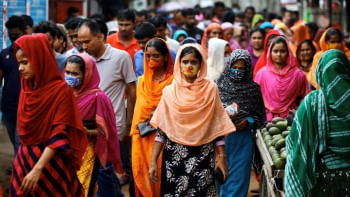South Asian countries lagging behind: speakers
South Asian nations are lagging behind in energy cooperation unlike European countries, which needs to be done in a “win-win situation” instead of seeing it through the “prism of politics” for the economic sake of this region, speakers at a conference said yesterday.
Stressing on a better power management system, they opined that governments should come forward to develop a “homogenous grid system” to exchange electricity for sustainable and trustful energy cooperation.
Bangladesh Heritage Foundation (BHF), a Dhaka-based policy dialogue platform, and Jawaharlal Nehru University (JNU) of India jointly organised the conference at Sufia Kamal auditorium of Bangladesh National Museum in the city's Shahbagh.
Waliur Rahman, chairman of BHF chaired the opening session of the conference while Prof Sanjay K Bhardwaj chaired the working session participated by academicians, former diplomats and energy experts from Bangladesh and India.
Terming current energy cooperation between Bangladesh and India as “very well” with “tremendous potential”, SD Muni, professor emeritus of JNU spoke of bilateral, trilateral and multilateral aspects of Bangladesh-India energy cooperation.
Prof Mohammad Tamim, pro-vice chancellor of Brac University, opined that problems among South Asian countries, which have impact on energy security of Bangladesh, can be resolved through regional cooperation and cross-border trade.
Speaking at the working session, energy expert Khondkar Abdus Saleque opined that more generation of power is not needed at this stage, because some of the surplus generation from Bangladesh can be exported to India in off-peak season. “Bangladesh can't use four thousand megawatts during off-peak.
So here is a situation: if the power grid is completed under BBIN (Bangladesh-Bhutan-India-Nepal), this power can flow to any place where it is required.”
He mentioned that there is no issue of power “export or import” in American or Western European power grids; rather everybody produces the power, put into the grid and electrons move according to demand.
“In future, if BBIN region wants to be successful, this technical barrier has to be removed… it needs regulation and agreement on pricing,” he said.
Replying to a query, Khondkar opined that energy security of Bangladesh is “threatened now” as the “documented gas reserve” is gradually being used up, and the country's current gas deficit is 13 hundred million cubic feet, while LNG supply “will not come” within the deadline.
However, Masud Ahmed, former comptroller and auditor general of Bangladesh differed with Khondkar, saying, “Bangladesh will take measures to meet its energy thirst in future.”
Prof Shahab Enam Khan of Jahangirnagar University's international relations department highlighted the political economy of energy cooperation, in context of different models of cooperation like BBIN.
Mentioning the “dependency syndrome” in technology as a major problem for Bangladesh, he said, “Bapex, Bangladesh's national energy organisation, was not satisfactorily able to harness the potential the Bay of Bengal can provide us.”
Prof Badrul Islam of Dhaka University's geology department said Bangladesh has lack of domestic robust technical experts to explore oil and gas, compared to India. “Energy cooperation has to be done in a win-win situation.”
He termed the idea of importing gas from Bangladesh as “wrong” while Bangladesh's position in case of Myanmar-Bangladesh-India gas pipeline “grossly wrong”.
“If Bangladesh had agreed to the pipeline with the provision that some of the gas would be sold to Bangladesh, then we would have very good supply of Myanmar gas.”
Prof Muchkund Dubey, former foreign secretary of India; Prof Ijaz Hossain of Bangladesh University of Engineering and technology (Buet); Prof Pooja Sharma of University of Delhi; Mollah M Amzad Hossain, editor of Energy & Power journal in Dhaka; Justice Sharif Lutfur Rahman; and Rafiqul Islam, director of Bangladesh Power Management Institute, spoke at the conference.

 For all latest news, follow The Daily Star's Google News channel.
For all latest news, follow The Daily Star's Google News channel. 



Comments